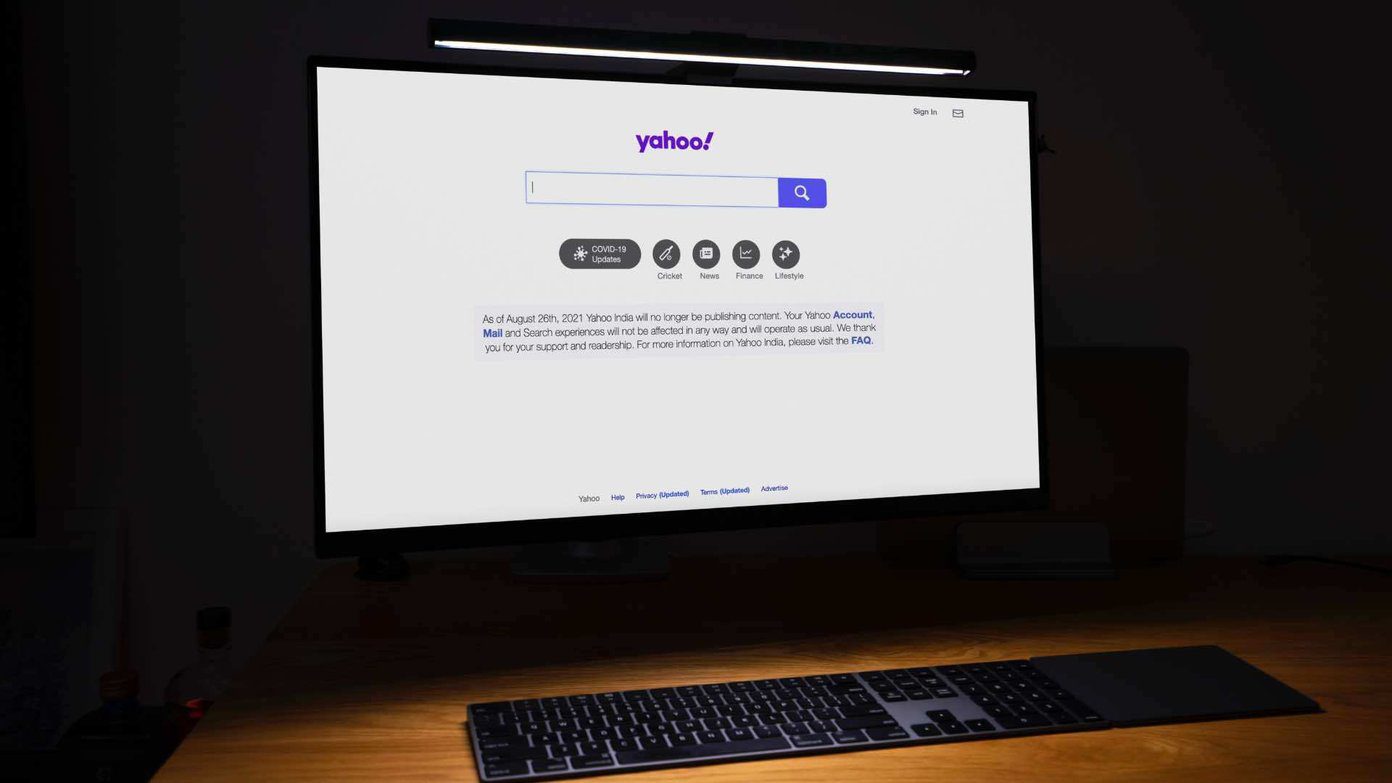Introduction
When you open your Chrome browser and find Yahoo as your default search engine, it can be quite surprising. You might wonder how Yahoo, a search engine that was once a dominant force on the internet, has become the default search engine on your Chrome browser. This unexpected change can lead to confusion and frustration, especially if you are accustomed to using a different search engine.
In this article, we will delve into the reasons behind Yahoo's presence as the default search engine on Chrome. We will explore the factors that led to this arrangement and provide insights into how you can modify the default search engine to align with your preferences. Whether you are a casual internet user or a tech-savvy individual, understanding the dynamics of default search engine settings on Chrome can empower you to tailor your browsing experience to suit your needs and preferences.
Let's embark on a journey to unravel the mystery of Yahoo as your default search engine on Chrome and equip you with the knowledge to navigate and customize your browsing experience effectively.
Understanding Yahoo as the default search engine on Chrome
Yahoo, once a dominant player in the search engine industry, has evolved over the years to become a multifaceted web services provider. Despite the rise of competitors, Yahoo has maintained its presence in the digital landscape, offering a range of services including email, news, and, of course, search. The partnership between Yahoo and Chrome as the default search engine is a result of strategic alliances and user preferences.
When you open your Chrome browser, the default search engine is the one that provides search results when you type a query into the address bar. In the case of Yahoo being the default search engine on your Chrome browser, it means that when you perform a search using the address bar, the results are powered by Yahoo's search algorithms and index.
The presence of Yahoo as the default search engine on Chrome reflects the evolving dynamics of the internet and the preferences of users. While Google remains the dominant force in the search engine realm, Yahoo has carved out its niche and continues to attract a dedicated user base. This is evident in the decision by Chrome to include Yahoo as a default search engine option, acknowledging the diverse preferences of its user base.
Understanding Yahoo as the default search engine on Chrome also sheds light on the concept of user choice and customization. Chrome, as a widely used web browser, aims to provide users with options to tailor their browsing experience. By incorporating Yahoo as a default search engine, Chrome acknowledges the significance of offering diverse search engine choices to accommodate the varied preferences of its user base.
Furthermore, the presence of Yahoo as the default search engine on Chrome underscores the competitive dynamics within the search engine industry. While Google maintains its dominance, the inclusion of Yahoo as a default option reflects the ongoing competition and the efforts of search engine providers to offer compelling alternatives to users.
In essence, the presence of Yahoo as the default search engine on Chrome is a reflection of the evolving digital landscape, user preferences, and the competitive dynamics within the search engine industry. It highlights the significance of choice and customization in the browsing experience, empowering users to align their browser settings with their preferences and habits.
How Yahoo became the default search engine on Chrome
The inclusion of Yahoo as the default search engine on Chrome is the result of strategic partnerships and user preferences. Google, the company behind the Chrome browser, has established alliances with various search engine providers to offer users a range of options when it comes to their default search engine. This strategic approach aligns with Google's commitment to providing a customizable and user-centric browsing experience.
Yahoo, with its rich history and diverse web services, emerged as a compelling choice for inclusion as a default search engine on Chrome. The decision to incorporate Yahoo reflects the recognition of its continued relevance and the preferences of a segment of internet users. By integrating Yahoo as a default search engine option, Chrome acknowledges the importance of catering to diverse user preferences and providing alternatives beyond its own search engine.
The process of Yahoo becoming the default search engine on Chrome also involves considerations of user behavior and engagement. Chrome aims to understand and adapt to the browsing habits and preferences of its users. This includes recognizing the appeal of Yahoo's search capabilities and the familiarity that users may have with Yahoo's interface and search results. By offering Yahoo as a default search engine, Chrome seeks to enhance user satisfaction and provide a seamless browsing experience that aligns with individual preferences.
Furthermore, the inclusion of Yahoo as the default search engine on Chrome underscores the competitive dynamics within the search engine industry. While Google maintains its position as the dominant player, the collaboration with Yahoo reflects an acknowledgment of the diverse landscape of search engine providers. This strategic partnership serves as a testament to the evolving nature of the internet and the significance of offering users a range of search engine options to cater to their preferences and habits.
In essence, the integration of Yahoo as the default search engine on Chrome is a result of strategic alliances, user preferences, and the commitment to providing a customizable browsing experience. The decision to include Yahoo reflects the evolving dynamics of the internet and the recognition of the importance of offering diverse search engine choices to accommodate the varied preferences of Chrome users.
Steps to change the default search engine on Chrome from Yahoo to another option
Changing the default search engine on Chrome from Yahoo to another option is a straightforward process that allows you to tailor your browsing experience to align with your preferences. Whether you prefer the comprehensive search results of Google, the privacy-focused approach of DuckDuckGo, or the efficiency of Bing, Chrome provides the flexibility to customize your default search engine. Here are the steps to change the default search engine on Chrome from Yahoo to another option:
-
Open Chrome Settings: Begin by opening the Chrome browser on your computer or mobile device. Click on the three-dot menu icon located in the top-right corner of the browser window to access the Chrome menu. From the menu, select "Settings" to proceed to the browser settings.
-
Access Search Engine Settings: Within the Chrome settings, navigate to the "Search engine" section. This section allows you to manage the default search engine and other search-related preferences.
-
Manage Search Engines: In the "Search engine" section, locate the "Search engine used in the address bar" option. Click on the dropdown menu to view the list of available search engines, including Yahoo, Google, Bing, and other options.
-
Add or Remove Search Engines: If your preferred search engine is not listed, you can add it by selecting "Manage search engines." This option enables you to add new search engines and set your desired search engine as the default choice.
-
Set a New Default Search Engine: To change the default search engine from Yahoo to another option, select your preferred search engine from the list provided in the "Search engine used in the address bar" dropdown menu. Once selected, Chrome will use the chosen search engine for address bar queries and search results.
-
Confirm the Change: After selecting your desired search engine, ensure that the change is reflected in the browser settings. You can perform a test search in the address bar to verify that the selected search engine is now the default option for your browsing activities.
By following these steps, you can seamlessly change the default search engine on Chrome from Yahoo to another option, empowering you to personalize your browsing experience and access search results from your preferred search engine. Whether you prioritize search accuracy, privacy, or specific features offered by alternative search engines, Chrome's flexibility allows you to tailor your browsing environment to suit your needs and preferences.
Conclusion
In conclusion, the presence of Yahoo as the default search engine on Chrome reflects the evolving dynamics of the internet, user preferences, and the competitive landscape of the search engine industry. The strategic partnerships and user-centric approach adopted by Chrome have led to the inclusion of Yahoo as a default search engine option, providing users with a diverse array of choices to customize their browsing experience.
Understanding the factors that contributed to Yahoo becoming the default search engine on Chrome sheds light on the significance of user preferences and the commitment to offering a customizable browsing environment. The collaboration between Google and Yahoo underscores the recognition of the diverse landscape of search engine providers and the importance of catering to the varied habits and preferences of Chrome users.
Moreover, the process of changing the default search engine on Chrome from Yahoo to another option exemplifies the flexibility and user empowerment embedded within the browser's settings. By providing a seamless and intuitive process to modify the default search engine, Chrome enables users to align their browsing experience with their preferred search engine, whether it be Google, Bing, DuckDuckGo, or other alternatives.
As the digital landscape continues to evolve, the presence of Yahoo as a default search engine on Chrome serves as a testament to the dynamic nature of user preferences and the ongoing competition within the search engine industry. It underscores the commitment to offering users a range of search engine options to cater to their diverse needs and habits, ultimately enhancing their browsing satisfaction and efficiency.
In essence, the inclusion of Yahoo as the default search engine on Chrome and the ability to customize this setting exemplify the user-centric approach and commitment to diversity within the browsing experience. By understanding the underlying reasons and the process of modifying the default search engine, users can navigate their browsing environment with confidence, knowing that they have the flexibility to tailor their experience to align with their preferences and habits.

























